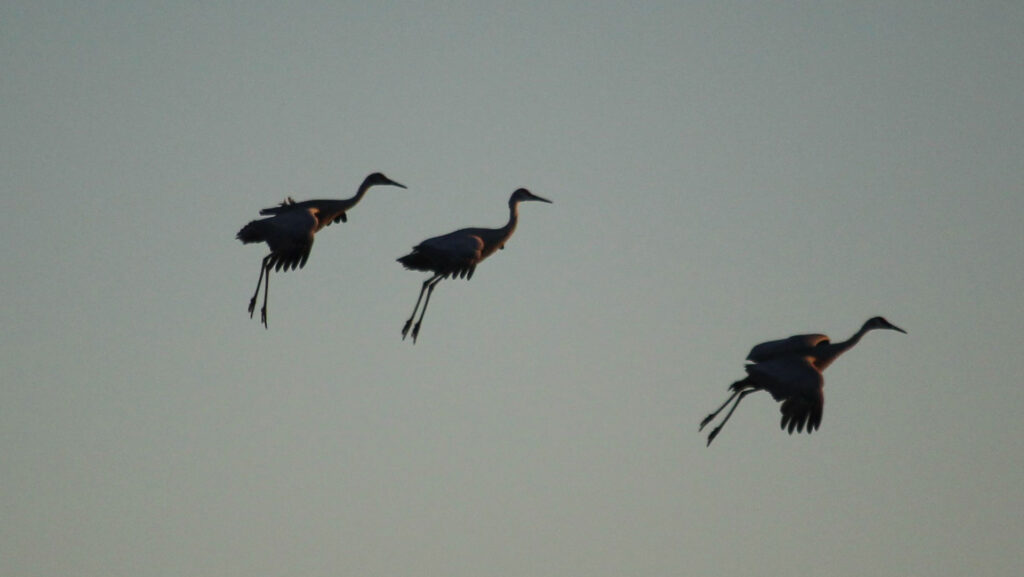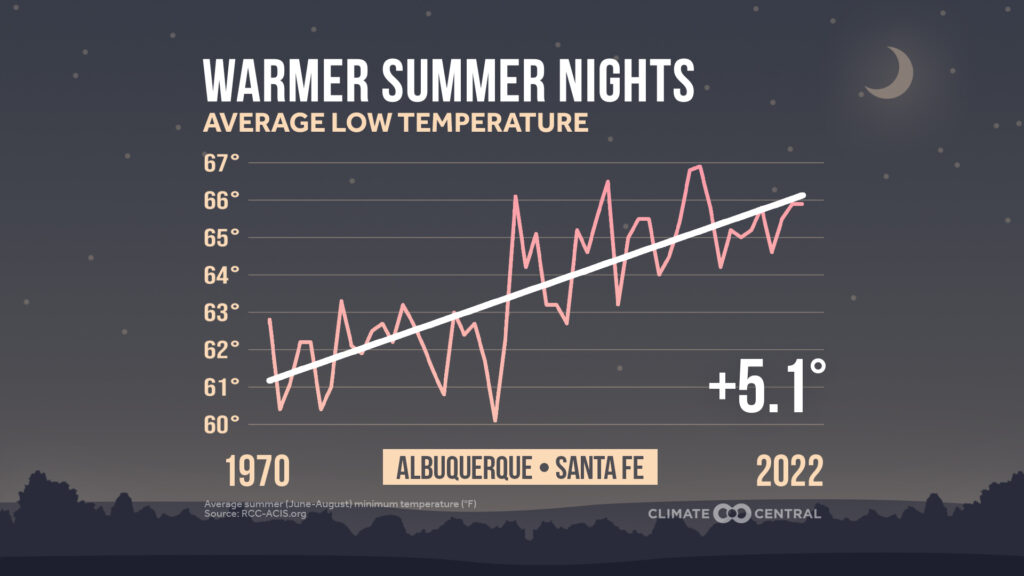Climate Change & Public Health

Welp. It’s that time of year. The sandhill cranes are starting to kettle up and head north. I’ll miss their graceful (and noisy) presence around the Middle Rio Grande Valley. It’s almost time, too, for the giant crow mob that winters in the bosque along the Rio Grande to move along. Those crows are less appreciated (by the owls as well as many of the humans), but I’ve come to love their presence, especially when they stream south over my house just after sunrise.
And now on to business.
Climate change is here. And it’s affecting our lives in ways we might not realize.
In 2021, Project ECHO at the University of New Mexico Health Sciences Center began a climate program with web-based trainings on health care decarbonizing, climate justice, and health equity. Dr. Joanna Katzman directs Project ECHO’s Public Health Initiatives, and she came on the show last week to talk about training health care professionals to recognize how climate change affects patient health. One example we talked about? Heat waves.
“People who live in urban areas are more affected by extreme heat and so if you’re working in these cities or if you’re homeless or if you’re a vulnerable patient—someone who might have a substance use disorder or if you don’t have air conditioning or if you’re impoverished—you might be much more susceptible to extreme heat,” Katzman said during our conversation.
“When we have these long days and weeks of hot temperatures, it would be really nice if New Mexico could put out more public service announcements about prolonged heat waves, and prolonged impacts. Many patients who have depression, who have psychotic disorders like schizophrenia, are on dopaminergic medications that, along with extreme heat, there are interactions that can adversely affect the patient,” she said.
We all know it’s getting warmer and staying warmer for longer. Another worrying trend is when the nights don’t cool down significantly.

“When the heat at night does not fall below a certain point…but it stays high, there’s increased irritability–(even) in someone who doesn’t normally get anxious or irritable or argumentative. We also know that violence in the community increases in the summer months and heat certainly exacerbates this. This has been studied over and over again in many peer-reviewed journals. So it’s the falling of the temperature at night that is really protective.”
Katzman’s conversation—and her work—is proactive. She’s not talking about gloom and doom. And the training she facilitates through Project ECHO is focused on individual and collective action. “There is hope,” she says. “There are so many things we can do together.” And, I’ve linked additional information at the end of this message.
Last week, while I was prepping for a radio interview, I pulled together a bunch of resources on fire season, snowpack, water forecasts, and climate. I thought you’d all like to have that information handy, as well:
• National Significant Wildland Fire Potential Outlook
• February 1, 2024 New Mexico Water Supply Outlook Report
• Snow Drought Current Conditions and Impacts in the West
• NRCS February 1st Final Streamflow Forecasts – Rio Grande
• NRCS February 1st Final Streamflow Forecasts – Upper Colorado River
• River Basin Tea-Cup Diagrams
And some of the news for you:
• “Gov’s half-billion bid on Strategic Water Supply wobbles” (Danielle Prokop, Source New Mexico)
• “Proposed Caja del Rio transmission project near LANL raises concerns” (Bryce Dix, KUNM)
• “A Tale of Two Eras” (Julie Ann Grimm, Santa Fe Reporter)
• “$300M needed for New Mexico land conservation; Supporters argue for funding in budget bill” (Adrian Hedden, Carlsbad Current-Argus)
• “Bosque Farms, Isleta and Peralta leaders rally against proposed Niagara expansion” (Felina Martinez, Valencia County News-Bulletin)
• “Revealed: the 1,200 big methane leaks from waste dumps trashing the planet” (Damian Carrington and Seán Clarke, The Guardian)
• “Earth breached a feared level of warming over the past year. Are we doomed?” (Shannon Osaka, The Washington Post)
• “With climate change, is it time to consider a Category 6 hurricane?” (Max Chesnes, Tampa Bay Times)
On February 26, please join NMPBS for an Indie Lens Pop-up screening of “Breaking the News,” a documentary about a group of women and LGBTQ+ journalists who launched a startup, The 19th*.
After the screening, NMPBS’s Andrea Quijada will moderate a community conversation with Bella Davis, Indigenous Affairs reporter for New Mexico in Depth; Valeria Hernandez and Lorelai Hopkins, student journalists for The Phoenix Times; and Susan Montoya, Associated Press Southwest Chief Correspondent; and me. That’s happening on Monday, February 26 from 5 – 7p.m. at the International District Library (7601 Central Ave NE in Albuquerque). Reserve your free ticket online!
For more information on climate change and public health:
Climate Change and Human Health ECHO Program
You can also learn more and sign up for Project ECHO’s upcoming environmental series, “Global Nuclear and Environmental Threats Critical to Climate Change and Human Health,” on their website.
Lastly, check out Gretchen Henderson’s project with the University of Arizona Poetry Center and Kent State University’s Wick Poetry Center, Dear Body of Water ~ if you haven’t already. You can write a love letter to your favorite body of water and also see the map of love letters.
P.S. If a friend forwarded you this message, sign up here to receive the newsletter yourself. You can also read recent newsletters online. And if you miss us throughout the week, follow Our Land on Instagram.


